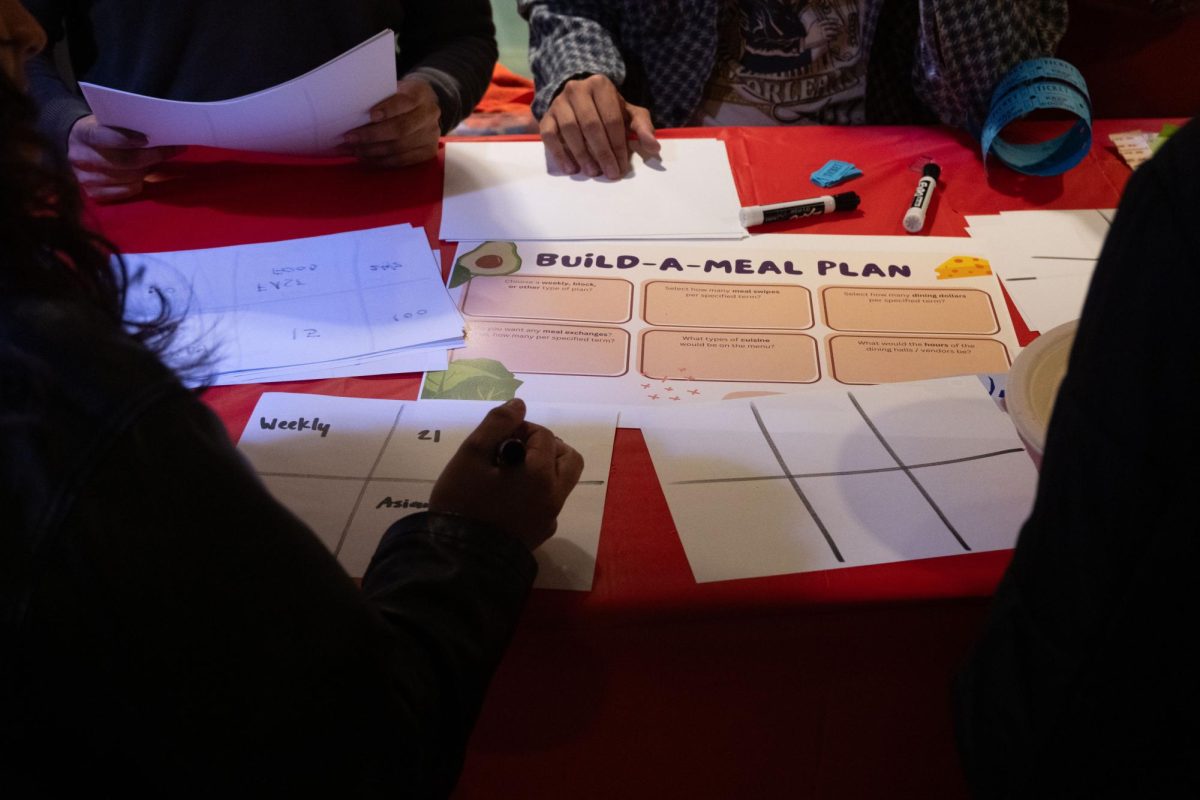After months of collecting student feedback, the Student Government Association’s Dining Advisory Board is getting ready to put a new, revamped meal plan in place for students beginning in 2024.
The Dining Advisory Board, created this semester and housed under campus affairs division of the Student Government Association, or SGA, consists of 13 board members who represent different clubs and organizations on campus but share one common goal: to reconstruct Northeastern’s meal plan.
“Our mission is to create an affordable, sustainable, diverse meal plan,” said Zi Glucksman, a third-year politics, philosophy, and economics major and vice chair of the board. “The goal [of the board] is to serve the student body as best as it can.”
Since September, the board has been gathering data through student input during listening sessions, tabling, events, such as a “Rocky Horror Dinner Show,” and its own observations to craft a new and improved meal plan proposal. On Wednesday, Student Life at Northeastern sent a campus-wide email that included a survey from the SGA and the Office for Student Life. The survey asked students what exactly it is they would like to see change in the meal plan, including affordability, dining hall operation hours and more diverse food options.

The plan the board is hoping to implement would include all aspects of student feedback it has received, including dining dollars, meal exchanges and the number of meals offered. The board is working with administration to not abandon the current meal plan altogether, but instead revamp it such that students and administration can agree on a new plan together. With tuition reaching a new high almost every year, board members said many students feel the university should be able to keep up with students’ needs when it comes to dietary restrictions, allergies and overall food quality.
“The meal structure that exists now has not changed in several decades,” said Greg Katz, a fourth-year mechanical engineering major and chair of the board. “Northeastern has changed so much. So we are in a place where I feel like we need to adapt to the student body that we have now.”
One of the board’s main focuses is adjusting the number of swipes offered by the current meal plan options. For 17 meals per week, which is the highest number of meals offered before the unlimited plan, Northeastern charges students $4,090 per semester. Even on this plan, students are not guaranteed three meals a day, seven days a week. Other plans offered to students are the unlimited plan, which costs $4,405 per semester, and the 12- and 7-meals-per-week options, which are $3,700 and $2,600 per semester, respectively.

“I feel like the astronomically high price compared to the really average quality does not match up — the price is too high for the quality of food served, specifically in the dining halls,” said Luke Sanders, a second-year electrical engineering major. “And the cost of a meal exchange doesn’t get you nearly as much food as what it should.”
While a typical meal swipe for a meal in a Northeastern dining hall is about $17 for breakfast, $20 for lunch and $22 for dinner, a meal exchange in the Curry Student Center is equivalent to $14 at most, Sanders said. Therefore, he feels that many students are shorted when it comes to using meal exchanges around campus.
Julian Herzing-Burkard, a Dining Advisory Board member and second-year international business major, said he had heard complaints about the meal exchange program from many students, specifically concerning “how much value that meal change has and how little choices there are.”
“How do we change that to make it, maybe, meal equivalency, for example?” Herzing-Burkard said.

In order to maximize the effects of a revamped meal plan, the Dining Advisory Board has used student outreach to ensure all students are heard and have a say in what they want in a meal plan.
“All the members of the board or most members of the board are also very involved in various organizations on campus,” Katz said. “So we are fostering those connections, using those connections to our advantage to spread the word that way.”
In February, the Northeastern Young Democratic Socialists of America, or YDSA, held its first rally as a part of its No Hungry Huskies campaign, which aims to combat food insecurity on campus. Since then, SGA and YDSA have engaged in conversation with the administration to begin working toward ending food insecurity on campus.
On Oct. 16, the board hosted a listening session and invited students to discuss their thoughts on Northeastern dining. The board also hosted a Nov. 16 Rocky Horror Dinner Show to gather student feedback in an interactive setting. There, the board gained insight into some of the most common concerns students have when it comes to meal plans.
One issue the board heard frequently was about the lack of food options in the dining halls.
“There’s so many different dietary restrictions, religious dietary restrictions or even just personal preferences and being vegan or vegetarian,” Katz said.
At the board’s Oct. 16 listening session, Sydney Rossi, a first-year business administration and economics combined major who has an egg and nut allergy, said she isn’t confident the food in the dining halls is safe for her to eat.
“A lot of the time when I’m trying to find food options, I have no idea if it’s been anywhere near eggs when I’ve had an allergic reaction due to cross-contamination,” Rossi said. “I’m in a place where I don’t really trust the dining halls because I’m never sure what’s safe and what’s not.”
First-year students like Rossi are required to be on a meal plan since they reside in university housing. But Rossi finds that being required to be on a meal plan that does not accommodate allergies traps students in situations similar to hers.
“I’m required to be in this dorm, required to be on this meal plan, but I don’t have any way to accommodate my own allergies,” Rossi said. “So I’m trying to find ways to work around it, but it’s really difficult, especially how Northeastern’s kind of put me and every freshman in the same box. But the box hasn’t worked for everyone and it’s not working for me.”
While the board members creating the revamped meal plan have accounted for undergraduate concerns, the board is also focusing on how graduate students are affected by the current meal plans and how to cater to their needs as well.

“I am just trying to understand how the community for the graduate student is with the meal options,” said Adithya Mysore Shivakumar, a board member and second-year graduate student in the College of Professional Studies. “Because when I came here I faced the same issues they do with food insecurity.”
Shivakumar, who represents graduate students’ dining needs, said that with Northeastern’s global presence, the university should offer more food options that are native to where its students live.
“I feel like you should see the demographics and where most of the people come from, and this would really help to shape the Northeastern dining room,” Shivakumar said. “Given the crowd that is from different places across the globe, they should have options that reach their home.”
Northeastern offers other ways for graduate students to obtain meal swipes if they are not on a meal plan. Swipe2Care was created in 2017 as a way for students on a meal plan to donate unused meal swipes to those in need. When the program was extended to graduate students in 2022, the number of requests for a swipe increased significantly, Glucksman said. Compared to any other demographic on campus, international graduate students request the most swipes, which suggests they are the most food insecure demographic on campus.
Therefore, Shivakumar feels the best way for the university to address graduate students’ needs in dining halls is to consider the demographics. “If you know the crowd, I think you can bring better options,” he said.
The Dining Advisory Board connects with students to gather feedback, then communicates the information it has gathered to the Northeastern administration.
“What I can tell from our communication [with administration] is that we have very similar goals,” Glucksman said. “The administration’s goal and the student goal on the board are unified to help the student body to the best it possibly can.”
While the board has gained traction, the revamped dining plan is not set to roll out just yet.
“It will definitely be rolling out in the fall of 2024,” Herzing-Burkard said. “We don’t know how much is going to change, but that is definitely the plan.”














